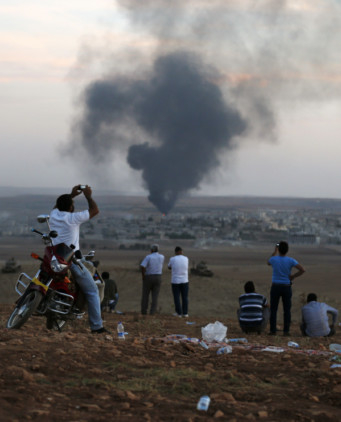
Suruc: Militants captured the headquarters of Kurdish fighters defending the battleground Syrian town of Kobani on Friday as a UN envoy warned of a looming “massacre” by Daesh.
Outgunned Kurdish militia were struggling to prevent the militants closing off the last escape route for the thousands of civilians still in or near the town, prompting an appeal for urgent military assistance.
US-led warplanes have intensified air strikes against Daesh fighters who have been attacking Kobani for three weeks but the Pentagon has warned that, without a force on the ground to work with, there are limits to what can be done.
The militants’ advance has brought the front line to just 1.3 kilometres from the Turkish border.
“Daesh now controls 40 per cent of the town,” said the Britain-based Syrian Observatory for Human Rights.
“The capture of the headquarters will allow the militants to advance on the border post with Turkey to the north of the town,” its director Rami Abdul Rahman said.
“If they achieve that, they will have the Kurdish forces inside Kobani completely surrounded.”
UN envoy for Syria Staffan de Mistura appealed to Turkey to take any action it could to protect the 12,000 or so civilians still in or near the town, warning they “will be most likely massacred” if captured by Daesh fighters.
Kobani was “literally surrounded” except for one narrow entry and exit point to the Turkish border, de Mistura said.
Up to 700 mainly elderly civilians were still inside the city centre, and another 10,000-13,000 gathered nearby.
“If this falls, the 700 — plus perhaps, if they move a little bit further, the 12,000 people ... will be most likely massacred,” he warned.
The envoy called on Turkey, “if they can, to support the deterrent actions of the coalition through whatever means from their own territory.”
“We would like to appeal to the Turkish authorities in order to allow the flow of volunteers at least, and their equipment to be able to enter the city to contribute to a self-defence operation,” he told reporters in Geneva.
The statement marked an unusual one by the United Nations, which usually strives to stay neutral in conflicts, but de Mistura explained the rare appeal by the precarious situation in the border town.
The coordinator of the US-led campaign against Daesh, retired US general John Allen, held a second day of talks in Ankara after the Nato ally insisted it could not be expected to take ground action against the militants alone.
Tony Blinken, US Deputy National Security Adviser, said in London on Friday that Turkey’s proposal to create a buffer zone in Syria is not a new idea and is not “on the front burner”.
The number of coalition air strikes around Kobani has jumped from a handful previously to 28 on Wednesday and at least 14 on Thursday, according to US Central Command, which runs the air war.
But officials insisted there was no change to US strategy, which prioritised the battle against Daesh in neighbouring Iraq where there were capable local forces to work with on the ground.
Commanders were mindful of the dire humanitarian situation for the Kurds in Kobani, but Washington did not consider it a strategic location, a US official said, speaking on condition of anonymity.
“We’re not going to be drawn into a town-by-town strategy,” the official said.
With the world media gathered just across the border in Turkey, the conquest of Kobani would be a highly visible symbolic victory for the extremists.
But US officials said there was no viable, moderate rebel force in Syria fighting the militants on the ground.












